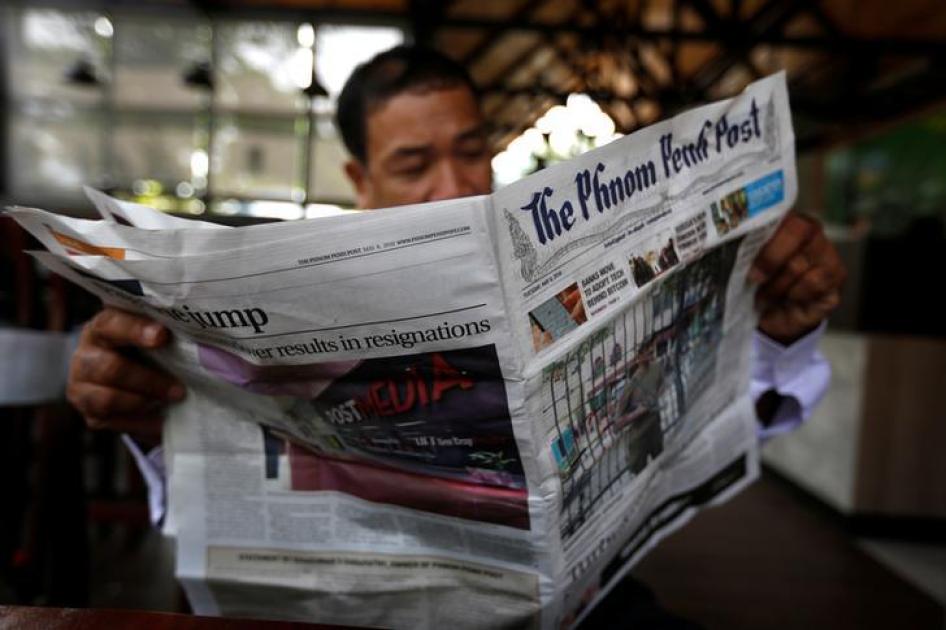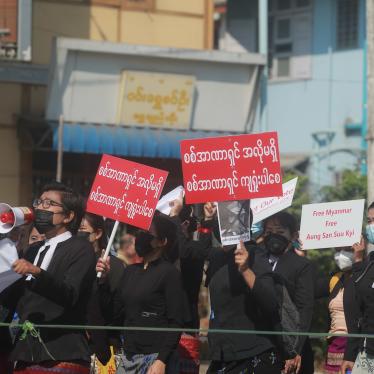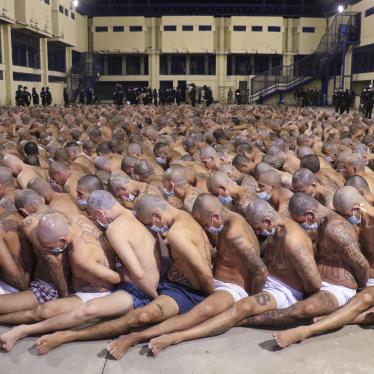(New York) – The government-coerced sale of Cambodia’s oldest English-language newspaper to a Malaysian businessman whose company has ties to Prime Minister Hun Sen marks the end of independent local newspapers in Cambodia, Human Rights Watch said today. The sale of the highly respected Phnom Penh Post was precipitated by a seemingly concocted tax bill of US$3.9 million levied against the paper, which was settled as part of the sale. A similarly vague tax forced the country’s other independent newspaper, the Cambodia Daily, to close in 2017.
“The Cambodian government imposed a bogus tax on the Phnom Penh Post to force its sale to a company that fired its top editor for defending the paper’s journalistic independence,” said Brad Adams, Asia director. “This is a transparent misuse of power intended to choke off independent media and reporting in the run-up to July’s national elections.”
The Phnom Penh Post was founded in 1992 by Michael and Kathleen Hayes during the United Nations peacekeeping mission as Cambodia’s first independent, nonpartisan newspaper since the Khmer Rouge came to power in 1975. The Post was sold in 2008 to Australian Bill Clough. On May 5, 2018, Clough confirmed the sale of the paper to Malaysian investor Sivakumar S. Ganapathy, owner of the public relations firm Asia PR. Clough announced that the $3.9 million tax bill was settled as part of the sale to Sivakumar.
On its website, Asia PR lists “Cambodia and Hun Sen’s entry into the Government seat” as one of its former clients. Asia PR also ran the pro-government Cambodia Times newspaper in the early 1990s.
Within hours of publication of a cover story about the newspaper’s new owner in the Post’s May 7 edition, Sivakumar ordered the removal of the article from the paper’s website. The same day, more than 20 current and former staff members issued a statement condemning the new owner’s demands to take down the front-page article, asserting that it had been written “in an attempt to maintain the transparency and integrity” of the paper, while also expressing “disgust for this decision made in contradiction to the values of a free press” that the paper had upheld since 1992.
The editor-in-chief, Kay Kimsong, was fired when he refused to take down the statement. At time of writing, a total of 14 Cambodian and foreign editors and journalists had been fired or resigned.
Media freedom has been under attack by Prime Minister Hun Sen and the ruling Cambodian People’s Party (CPP) for many years, but the campaign has intensified in the past year. In August 2017, the government ordered the closure of 32 radio frequencies across 20 Cambodian provinces that had broadcast programs critical of the government, including Radio Free Asia (RFA) and Voice of America (VOA). RFA closed its office in Phnom Penh on September 12, after 20 years of operations in Cambodia, citing threats to its staff and the banning of its FM radio broadcasts. A few days later, the Ministry of Interior threatened journalists who had worked for RFA with legal action if they continued reporting for RFA.
The government and CPP have long controlled the country’s television stations. The CPP reneged on a 2014 promise – part of the deal to resolve the political stalemate following unfree and unfair elections in 2013 – to allow the opposition Cambodia National Rescue Party (CNRP) to operate its own station. The government has since dissolved the CNRP.
Over the past year, Cambodian authorities have adopted a series of controversial laws and amendments to existing laws, with others pending, to restrict the rights to freedom of expression and the press in Cambodia. For example, in February 2018, the National Assembly adopted a lese majeste (insulting the monarchy) law that the minister of justice explicitly stated would apply to media outlets.
“Hun Sen has effectively killed the spirit and practice of independent journalism that so many Cambodians have struggled and even died for over the past 25 years,” Adams said. “Donors have poured billions of dollars into Cambodia in an effort to help the country transform into a rights-respecting, multiparty democracy. They need to pressure Hun Sen to restore press freedom and end the campaign to silence all critics before more fundamental freedoms are wiped out.”









